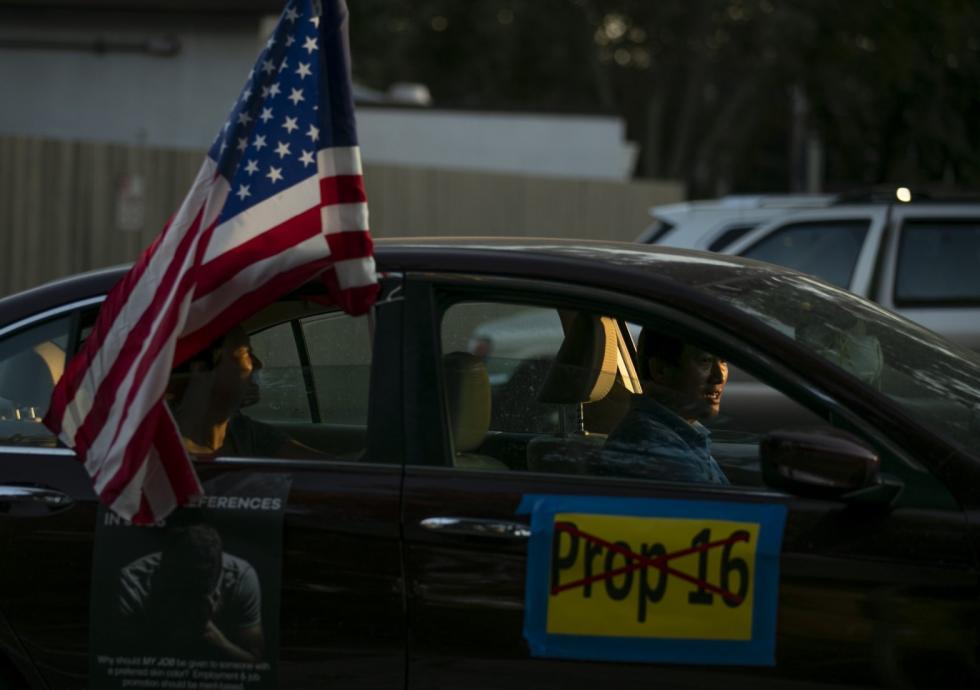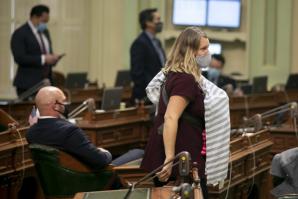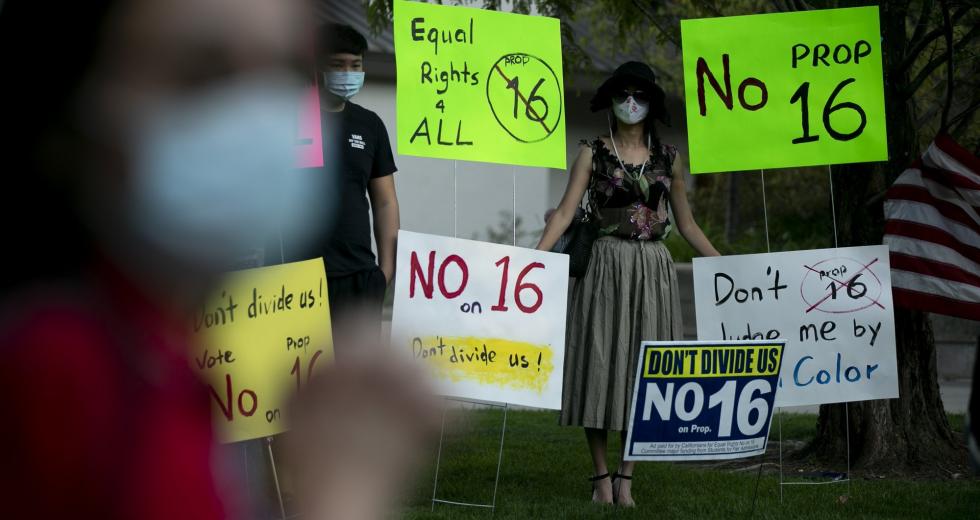Ling Kong supports universal healthcare and more spending on public schools in poorer areas. She laments how far California and the U.S. have fallen behind other countries in providing early education to children under five. “That’s the reason why I’m in the Democratic Party,” Kong said.
She’s also voting against Proposition 16. That’s the affirmative action ballot measure that would again allow public agencies such as local governments and universities to consider race, gender and ethnicity as a factor in admissions, contracting and employment.
“I agree with the idea of equity and trying to right past discrimination,” said Kong, a Silicon Valley computer engineer and environmental commission member for the city of Milpitas who’s appeared in campaign videos arguing against Prop. 16. But allowing for race as a factor in decision-making “is a Band-Aid solution,” Kong said. “I’d rather have the government work harder to do real reforms at the root of the issue.”
“I’d rather have the government work harder to do real reforms at the root of the issue.”
LING KONG, VOTER AGAINST PROP. 16
Many voters like Kong — aligned with the Democratic Party — are breaking ranks and planning to vote against Prop. 16, and with that, eschewing the endorsement of the state party and scores of elected Democrats including Gov. Gavin Newsom, Sen. Kamala Harris, not to mention several Bay Area sports teams, business groups, labor unions and large-city newspapers.
Despite the endorsement firepower, the big-tent party of California is a divided house, with fewer than half of Democratic likely voters, 46%, telling pollsters for the Public Policy Institute of California in September they’d vote for Prop. 16. The rest were either unsure or would vote no. It’s one major reason only about a third of likely voters overall support the ballot measure, less than those who oppose it, according to two September polls — PPIC and Berkeley IGS Poll.
Proposition 16 “should be doing better than it is,” said Arnold Steinberg, a strategist for Californians for Equal Rights, the main group challenging the measure. A Republican, Steinberg was the strategist behind Proposition 209 in 1996, the ballot measure Californians approved that banned public agencies from using race, gender and ethnicity in admissions and hiring. “I think it’s not polling well because they don’t really have a clear message, because a lot of average voters don’t see a big crisis.”
Meanwhile, the Yes camp disagrees there’s no crisis and says the 90’s campaign Steinberg led is part of the problem they face.
“We’ve said from the beginning that our biggest hurdle is the intentionally misleading language that the architects of California’s ban on affirmative action put in our state Constitution,” said Andy Wong, the campaign manager for Yes on 16, in a press release.
Demonstrators participate in a caravan against prop. 16, a state
ballot initiative that would reinstate affirmative action, in
Walnut Creek on Oct. 16, 2020. (Photo by Anne Wernikoff for
CalMatters)

Why Prop. 16 Is Behind in the Polls
There are several reasons why support for Prop. 16 is muted, experts told CalMatters.
Affirmative action confuses the electorate, said Garrick Percival, chair of the political science department at San Jose State University.
He brought up the issue of quotas in admissions — though the Supreme Court deemed those unconstitutional since the 1970s, that’s a footnote that the typical voter may miss. And though the Supreme Court has ruled several times that race as a factor in admissions is constitutional, “those kinds of nuanced arguments often get lost,” Percival said.
Crucially, there are educational benefits in a diverse student body, the court has said. But it also introduced numerous principles that are supposed to signal whether a college’s admissions policy that uses race as a factor passes constitutional muster, said Art Coleman, a lawyer who advises colleges on equity and diversity matters.
The court upheld the University of Texas’ use of race in 2016 in part because the university’s research showed that when it didn’t consider race, few classes had more than one Black student. Colleges have to show that their enrollment policies are narrowly tailored to reach their diversity goals. They also have to show that existing race-neutral approaches are insufficient to reach those goals. But awarding extra points to applicants for their race is a no-no, the court ruled in 2003. The principles go on, owing to four decades of case law.
The upshot is that “when you have people confused about what the initiative does, they say they’re going to vote no,” Percival said.
And the concept itself may not have as much natural support as other liberal causes. In the September Berkeley IGS poll, only 51% of Black voters said they support Prop. 16. Even though Black voters account for a small percent of the state’s electorate, it “doesn’t bode well for fielding a cross-racial and -ethnic coalition in support of affirmative action,” Percival said. More Latino voters support Prop. 16 than don’t, according to the same poll, but a majority are either undecided or against it.
Nor does it help voters on the fence to see some racial groups oppose Prop. 16, Percival added. Asian American organizations are split on the issue. Many are a major voice and volunteer presence on the No side while the Yes side counts key Asian and Pacific Islander groups among its supporters.
Like in California, national polls indicate overwhelming support for affirmative action in the abstract but the enthusiasm craters once the public is asked whether it supports using race as a factor in decision-making. A 2018 Gallup poll found that 61% of Americans supported this language: “Do you generally favor or oppose affirmative action programs for racial minorities.” But when Pew Research Center asked Americans in 2019 whether race should be a factor in admissions, 73% said no.
Moderates Matter
Further hurting support for Prop. 16 is that while California is overwhelmingly blue, the Democratic Party draws a good portion of its backing from sympathetic independents, who represent nearly 24% of the electorate. And according to PPIC, 58% of independents would vote no on 16.
According to a PPIC poll, 58% of independents would vote no on Proposition 16.
Steve Miller is an independent living in Orange County, among the “vast majority that is against Trump and against Prop. 16,” as he put it. A former Republican who campaigned for George W. Bush and was active in the UC Davis college Republican club in the 1990s, he abandoned the party in 2016 after Trump won the GOP nomination for president. Miller counts himself as part of the Blue Wave of voters who swept out every Republican member of Congress in the Southern California county that’s been a bastion of conservatism.
But while he plans to continue voting for Democrats federally, he’s swung back to Republicans on state issues, entirely because state Legislative Democrats ushered in the measure that eventually became Prop. 16 this year. Miller, whose two children — a middle schooler son and a daughter in high school — are of Taiwanese ancestry, views taking race into account in admissions as racism by another name.
“I don’t see that much difference between Donald Trump saying ‘he’s a Mexican’” about a judge “rather than viewing him as an individual American, and the UC Regents looking at a student saying he’s a Chinese student,” Miller said, who has a volunteer role Californians for Equal Rights as the Orange County Co-Chair.
The Yes Side Begs to Differ
A September PPIC poll showed a double-digit deficit in voter support for Prop. 16, a result the Yes campaign spins as misleading. The PPIC poll asked likely voters how they’d vote on Prop. 16 by reading the ballot title back to them and offering a brief description of what it would do.
It’s worth noting that California Attorney General Xavier Becerra, a Democrat, is responsible for ballot measure descriptions, including the one for Prop. 16. Critics of the measure language said it favors the Yes camp.
“You can look at just a poll on the ballot language alone, but most voters, they ask their friends and their family,” said Nicole Derse, a campaign strategist for the Yes side. “Or they Google and they look for their trusted sources, whether their trusted source is the LA Times or the Democratic Party.”
Those “trusted sources” include endorsements from the editorial boards of the Los Angeles Times, Mercury News, La Opinión, San Francisco Chronicle, and the San Diego Union-Tribune, among others, and dozens of local, state and federal California elected officials, including Gov. Newsom and Sen. Harris.
“We just think that you can’t totally tell from a read on the ballot language alone,” Derse said.
In recent days, Prop. 16 campaign volunteers called almost 100,000 voters. Last Friday college students hosted several in-person and virtual rallies.
The polling results did galvanize enthusiasm among Yes on 16 supporters. The poll “made them realize that they had a real fight on their hands,” Derse said. In recent days campaign volunteers called almost 100,000 voters. Last Friday college students hosted several in-person and virtual rallies.
The Yes side has launched a TV campaign in Los Angeles, San Diego and the Bay Area, purchased ads in Asian and Pacific Islander print publications and Spanish-language media, including Univision, and plans to expand its television presence in Los Angeles before Nov. 3.
But with just under two weeks left before all ballots must be submitted, the campaign is running out of time.
Steinberg of the No side doesn’t count the Yes campaign out. The home stretch of election season will see a flurry of mailers telling the state’s millions of Democratic Party voters what to support. “We never know how effective that will be,” he said. “They could well win this thing.”
CalMatters.org is a nonprofit, nonpartisan media venture explaining California policies and politics.
–
Stay up to date on business in the Capital Region: Subscribe to the Comstock’s newsletter today.
Recommended For You

For Many Californians, the Pandemic Marks the End of ‘Barely Making It’
The pandemic is accelerating the demise of the middle class, leaving many unable to sustain financial independence. In Silicon Valley and elsewhere, middle-class workers have found themselves unable to make rent.

Nail-Biter for Family Leave Bill Reveals Tough Realities for Working Moms
Why did a lawmaker need to bring her newborn to the COVID-exposed state Capitol to do her job? To help pass a new family leave law.

This Fall, Make Your Vote Count
To open our October issue, Comstock’s executive editor considers the upcoming election and statewide ballot measures worth taking a closer look at.

If Voters Raise Taxes on Corporate Landlords, Will Small Biz Foot the Bill?
If Prop. 15 passes, any commercial or industrial property owner with more than $3 million of California real estate would have to pay taxes based on the current market value of the property, rather than the original purchase price.



